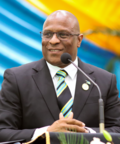By September 2026 | ||||||||||||||||
All 41 seats in the House of Assembly 21 seats needed for a majority | ||||||||||||||||
|---|---|---|---|---|---|---|---|---|---|---|---|---|---|---|---|---|
| ||||||||||||||||
 Constituencies (pending for updates; two new constituencies: Bimini & Berry Islands and St. James are being created [1] ) | ||||||||||||||||
| ||||||||||||||||
General elections are scheduled to be held in the Bahamas by September 2026 to elect all 41 members of the House of Assembly. [2] [3]

